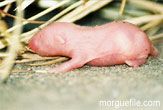
Scientists have fertilized mouse eggs with sperm created from embryonic stem cells in the lab, a new study reports.
The achievement could lead to a better understanding of sperm production and give rise to new infertility treatments, the researchers say.
Previous studies have shown that embryonic stem (ES) cells can give rise to cells resembling mature egg and sperm, but the functionality of such lab-grown gametes have never been tested. In the new study, the researchers showed that ES-sperm can develop into mature sperm in the laboratory or transplanted into the testes of mice, where they can be left to mature.
After maturation, the sperm was used to successfully fertilize mouse eggs. Six of the seven mice born using the technique developed into adult mice.
The study, led by Karim Nayernia of the Institute of Human Genetics in Germany, is detailed in the July issue of Developmental Cell.
- Sniff and Swim: How Sperm Find Eggs
- Longest Known Sperm Create Paradox of Nature
- Scientists Plan to Craft Embryo from Two Women
- Stem Cells in Lab Make Sperm
Sign up for the Live Science daily newsletter now
Get the world’s most fascinating discoveries delivered straight to your inbox.












